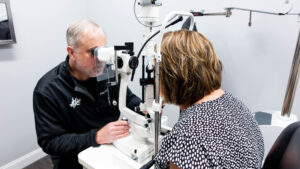Cataracts affect millions of people worldwide, with age being the primary risk factor. At St. Luke’s Cataract and Laser Institute, we help patients recognize early signs of cataracts to seek timely treatment and maintain optimal vision quality. This simple self-check guide will help you identify potential cataract symptoms before they significantly impact your daily life.
Cataracts develop gradually, often making symptoms easy to overlook initially. The most common early signs include:
The Reading Test: Try reading small print in various lighting conditions. If you need brighter light than usual or struggle with clarity, this could indicate early cataracts.
The Color Check: Look at vibrant objects like flowers or colorful artwork. If colors seem duller or more yellow-tinted than before, cataracts might be developing.
The Night Vision Assessment: Pay attention to your comfort level driving at night. Increased difficulty with oncoming headlights or streetlights may signal cataract formation.
The Glare Test: Notice if you’re more bothered by bright sunlight or indoor lighting than previously.
While this self-check guide provides valuable insights, professional evaluation is essential. At St. Luke’s Cataract and Laser Institute, we recommend scheduling a comprehensive cataract evaluation with one of our four cataract surgeons if you experience any combination of these symptoms, especially if you’re over 60 or have risk factors like diabetes, smoking history, or prolonged sun exposure.
Dr. Jeffrey Wipfli, one of our leading cataract surgeons, emphasizes that:

“Cataracts will eventually affect all of us at some point in our lives. When these symptoms start to bother you take comfort in the fact that they are easily treatable. You don’t have to let cataracts affect your daily activities or prevent you from living a full life. It is a common misconception that you have to wait until cataracts are ‘ripe’. In most circumstances you don’t have to wait and continue to struggle when these symptoms occur. The right time to fix a cataract is when you are unhappy with your vision and you want to see better. Our team at St. Luke’s is ready to help.”
This reassurance highlights that you don’t have to wait until your cataracts are advanced. Treatment is available when you are ready to improve your vision and quality of life.
UV exposure varies significantly by location. Residents in sunny climates like Florida face higher cataract risks due to intense sunlight. Similarly, high-altitude areas experience increased UV exposure. Regardless of your location, wearing UV-protective sunglasses is crucial for prevention.
Early detection makes cataract management more effective. At St. Luke’s Cataract and Laser Institute, our advanced surgical techniques and state-of-the-art technology help restore life changing vision for our patients. Don’t wait until cataracts severely impact your quality of life. Our experienced ophthalmologists can help determine the best treatment timeline for your unique needs.
If you find yourself asking, “What are the symptoms of cataracts?” remember that symptoms can vary between individuals, but recognizing these early signs empowers you to take proactive steps toward maintaining healthy vision throughout your life.
The team at St. Luke’s Cataract and Laser Institute provides comprehensive eye care and cataract treatment. Contact us today to schedule your consultation with our experienced ophthalmologists, or schedule online

